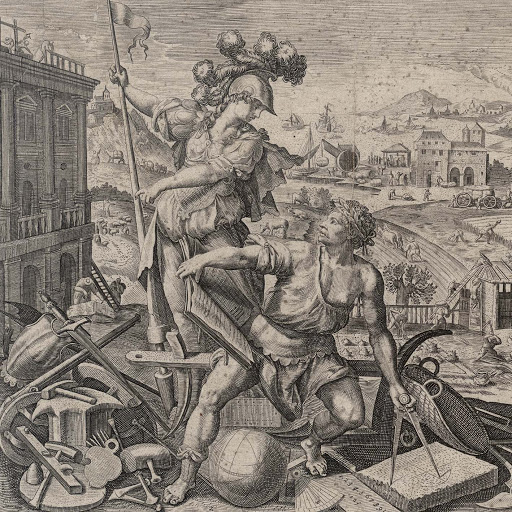Unidentified engraver from the circle of Raphael Sadeler I (1560/61–1628/32)
Note: there is a possibility that this is a first state
impression by Raphael Sadeler I before the inscribed signature details were
added in the second state. I have my doubts, however, as the foliage in the distant
tree at far right doesn’t appear “right.” Nevertheless, the plate size is close
to Sadeler’s engraving and Sadeler may have altered the foliage in the second
state which may account for the inconsistency to the treatment of the foliage that
I see.
“Labor”, c1591, after the engraving by Raphael
Sadeler I, after a drawing by Maarten de Vos (aka Maarten de Vos;
Maerten de Vos) (1532–1603) in the Bibliothèque Royale Albert 1er, Berlin (inv.
F 244.74), published by Claes Jansz. Visscher (aka Nicolaes Jansz.Visscher;
Piscator) (1587–1652).
Engraving on laid paper trimmed with a small
margin around the image borderline and backed with a support sheet.
Size: (sheet trimmed slightly unevenly) 21.8 x
25.5 cm; (image borderline) 19.5 x 25 cm.
Lettered above the image borderline: (centre) “LABOR”.
Numbered within the image borderline on lower edge:
(left of centre) “2”.
Lettered below the image borderline in two columns
of four lines of Latin: “Inde ubi iam firmata …/ …/ …/ …// …/ …/ …/ … cupio
posteritate coli."
TIB 7101.190 C1 (Isabelle de Ramaix 2006, “The
Illustrated Bartsch: Raphael Sadeler I”, vol. 71, Part I [Supplement], New
York, Abaris Books, p. 273, cat. no. [7101] .190 C1).
Ref. for Raphael Sadeler I: Hollstein XXI.255.207;
Hollstein XLIV.289.1463 (F. W. H. Hollstein 1954–2010, “Dutch and Flemish
Etchings, Engravings and Woodcuts,” vols. 1-64, Amsterdam, 1954–2010, cat. no.
255, p. 207; 1463, p. 289).
The Metropolitan Museum of Art offers the
following insights about this print:
“Love, labor, honor, and pain: these are the four
stages of human life according to many early modern artists, including Sadeler.
In this image of labor, Minerva, goddess of crafts, commerce, and the arts (as
well as wisdom), appears above a muscular young man who seems to have been
interrupted in the act of measurement. He gazes at a building under
construction, with a compass in his left hand, a large architectural treatise
in his right, and various instruments of the liberal arts at his feet. In the
distance are industrious scenes of men and women engaged in harvesting and
weaving. Labor is understood here to encompass not only the virtues of physical
activity but also the diligence required to produce works of art, mathematics,
and science”
(https://www.metmuseum.org/art/collection/search/739485?).
Condition: strong impression trimmed with a small
margin around the image borderline and laid onto a support of
archival (millennium quality) washi paper. The sheet has a flattened centrefold
and restorations (e.g. tears at upper left corner and a hole in the lower
margin to the left of the lettered text), otherwise the sheet is in a good condition
for its considerable age with no significant stains.
I am selling this interesting engraving expressing
the early 17th century notion of work—as expressed through the symbolic
representation of the tools of trades and the liberal arts, physical labour, technical
manuals and best practices—for the total cost of AU$287 (currently US$206.85/EUR174.73/GBP157.72
at the time of this listing) including Express Mail (EMS) postage and handling
to anywhere in the world (but not, of course, any import duties/taxes imposed
by some countries).
If you are interested in purchasing this beautifully
executed old master engraving, please contact me
(oz_jim@printsandprinciples.com) and I will send you a PayPal invoice to make
the payment easy.
This print has been sold











No comments:
Post a Comment
Please let me know your thoughts, advice about inaccuracies (including typos) and additional information that you would like to add to any post.